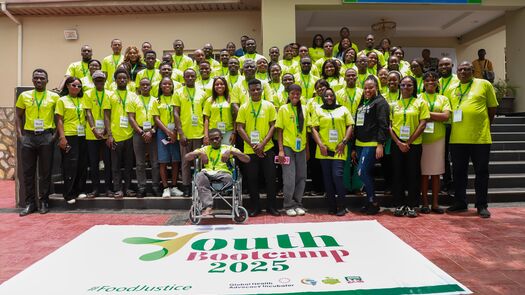November 25, 2025

This past August, International Youth Day highlighted the power of youth leadership. In that same spirit, Global Health Advocacy Incubator (GHAI)’s partner Corporate Accountability and Public Participation Africa (CAPPA) convened Nigeria’s first ever youth boot camp on food justice, bringing together young advocates from all six geopolitical zones to learn from one another and sharpen a collective call for healthier food systems. The camp builds on CAPPA’s ongoing work to elevate youth leadership in the movement for healthier food systems.
In an earlier conversation with CAPPA advocates Abayomi Sarumi and Opeyemi Ibitoye, we explored how young people in Nigeria are stepping up as champions for food justice. This time, we wanted to go deeper. How can youth not only speak up but also shape and pass the policies needed for change? We spoke with the organizers of the boot camp to find out.
From Training to Action
We began by asking how CAPPA sees participants translating what they learned into real advocacy campaigns for food justice.
Many of the participants were early-career professionals and passionate advocates already working in human rights and public health. While they arrived with different levels of knowledge, by the end of the boot camp, they shared a clear understanding that effective food policies are central to addressing diet-related health challenges and supporting a sustainable, healthy food environment.
Participants have already begun applying their skills by engaging policymakers and mobilizing communities. Across states, youth are holding advocacy meetings with state-level officials, working with traditional and religious leaders, speaking in schools, organizing community sensitization campaigns and advocacy walks and even bringing the conversation into hospitals and clinics.
What Youth Bring to the Movement
We asked what youth uniquely contribute to food policy advocacy.
CAPPA lauded young people’s distinct perspective, creativity, strong digital networks and a powerful ability to shape narratives that resonate with both peers and policymakers. In Nigeria, where youth make up roughly 60 percent of the population, their collective influence cannot be ignored. Although youth have historically been sidelined in policy processes, thanks to CAPPA’s support, they are increasingly emerging as informed advocates able to combine evidence and strategic communication.
Recognizing that the food and beverage industry heavily targets young people with unhealthy products, CAPPA equips youth with accurate information and advocacy skills. This helps them challenge harmful practices, amplify community voices and drive accountability in policy development and implementation.

Facing Industry Pushback
One of the toughest challenges for any advocate working on food policy is facing powerful opposition from the food and beverage industry. We asked how CAPPA prepares youth to push back and stay strong.
A key strategy is enabling youth to use credible data to educate and mobilize the public. CAPPA has invested in country-specific research, and many youth advocates were directly involved in this work. Because they understand and can defend the evidence, they are able to counter industry narratives designed to downplay health risks or shift attention away from public health concerns.
CAPPA teaches youth to identify industry tactics, lead evidence-based discussions and build public support for pro-health policies. Digital platforms and peer networks also play a strategic role, allowing youth to challenge misinformation and and keep the conversation focused on health and human rights rather than corporate interests.
To highlight youth leadership in new ways, CAPPA is incorporating creative engagement strategies. Recent efforts have included youth-focused events that remove unhealthy beverages from social spaces and introduce art-based advocacy—what CAPPA is calling “sip-vocacy” and “artivism.” At the boot camp, a music producer and a film director worked with participants to explore how creative mediums can support activism.
Building Alliances Without Tokenism
For a sustainable progress in the food justice movement and beyond, it is important for youth to engage a wide range of partners who influence both policy and public perception. These partners must embody integrity, leadership and commitment to the values of these young people.
To ensure youth are partners rather than symbolic participants, CAPPA focuses on building their confidence and credibility. Youth receive training in data interpretation, advocacy tools, stakeholder mapping and communication strategies. They are encouraged to form partnerships based on shared values and to take active roles in planning, implementation and representation.
Overcoming Barriers to Policy Change
Policy advocacy is rarely straightforward. We dug into the biggest obstacles youth face in influencing policy and how CAPPA helps them navigate challenges.
One major obstacle is maintaining resilience in the face of slow and complex policy processes. Young people often want quick results, but policy change in Nigeria can take time. CAPPA helps youth manage this reality by building both technical knowledge and emotional resilience. Programs include mentorship, peer learning and advocacy activities that keep youth connected, motivated and equipped to stay the course in driving food justice.
Youth are also involved in CAPPA’s organizational trainings, events and strategy sessions, helping them see how their contributions shape real outcomes. Recognition and leadership development support long-term engagement and help prevent burnout.
Looking Ahead
Finally, we asked the organizers to share their vision for the future.
In the next five years, CAPPA envisions a vibrant, youth-powered food justice movement in Nigeria and across Africa that is driving measurable policy change and setting the standard for inclusive advocacy. Their efforts will help contribute to national policy wins, including effective implementation of the sugar-sweetened beverage tax, front-of-pack warning labels and sodium reduction targets. Youth advocates will be recognized as contributors to national policy formulation, not only in food and nutrition but across economic and social policy.
The movement will continue to grow into a continental network for mentorship and knowledge-sharing that educates, equips and empowers young Africans to lead sustained, impactful advocacy for healthier and more equitable food systems.
Youth are not just the future of food justice. They are already shaping strategies, building alliances and driving accountability. CAPPA’s youth boot camp is one step toward ensuring their advocacy translates into meaningful policy change.



